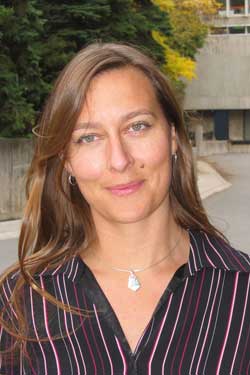Do scientists believe in fate? If you talk to Dr. Kathryn Preuss (BSc '95) about her academic life and professional career, you'll notice a string of coincidences and happenings that seem to have set her on a path that's led Preuss to her current position as an associate professor at the University of Guelph and a Tier II Canada Research Chair in the Chemistry of Molecular Materials.
It started when Preuss was a school kid, and her father, Dr. Peter Preuss, taught philosophy at the University of Lethbridge.
"I remember going to the Christmas parties, running around and having fun on campus as a child," recalls Preuss. "The U of L has always been a positive environment for me."

Attending the U of L was therefore pretty much in the cards for Preuss from the beginning. She knew the University well and was aware of its great undergrad reputation across the country. Preuss enrolled at the U of L with the intention of taking her talent for science into the field of medicine. But as it happened, fate once again played its hand.
"When you're a girl and you're good at science, everybody tells you that you should become a doctor, so that's what I assumed I'd be," says Preuss. "But then I met professor René Boeré."
In 1992, Preuss had earned the highest marks among all first-year chemistry students. At the end of the year, Boeré approached Preuss about accepting a summer job in his lab and she jumped at the opportunity. In need of a job, the idea of getting paid to do something she was genuinely interested in was too enticing to pass up.
Preuss spent that summer conducting experiments on inorganic synthesis and doing all sorts of exciting things that very few first-year undergrad students ever have the chance to do.
"It was eye opening," recalls Preuss. "I couldn't believe I was getting paid to do all that cool stuff and was building my academic credentials at the same time. Suddenly I realized that it was possible to be a professional chemist, to do research and actually make a living at it."
From there, Preuss's path took a turn. She focused on obtaining a degree in chemistry and continued to work in various professors' labs between semesters. Preuss furthered her experiments in inorganic synthesis and later expanded her research to the areas of organic synthesis, thermodynamics and photochemistry.
By the time Preuss had finished her undergraduate studies, she had no fewer than seven published papers to her name – more than most PhD students tend to have on their CVs. Preuss graduated with distinction from the U of L, was awarded the Faculty of Arts & Science Gold Medal (Science) for her achievements and went on to complete a PhD in inorganic chemistry at the University of Waterloo.
Today, Preuss is a leading expert in the field of materials science. She has received numerous awards for her work, including the Royal Society of Canada's Alice Wilson Award, the Natural Science and Engineering Research Council of Canada's UFA University Faculty Award, and the Ontario Government's Early Research Award.
Her research is innovative and influential – the magnitude of which only a chemist can truly appreciate.
"We are attempting to make bifunctional or multifunctional materials, but our design is unique," she explains. "We are the first to actually develop thiazyl radicals as ligands in a rational way, and we have added a new class of radicals. We've taken the entire metal-radical concept a step further than it has every been taken before."
Ask her how she feels the University of Lethbridge prepared her for academic achievement and professional success, and Preuss's response is crystal clear.
"My education at the U of L is directly responsible for where I am today," says Preuss. "If I hadn't gone to the U of L, met professor Boeré and worked in his lab, I wouldn't have become a chemist. None of what I've done would have been accomplished. The U of L gave me the opportunity to do a lot of really significant research and be recognized for it early on. Attending the U of L definitely gave me a head start and got me going in the right direction, academically and professionally."
It might be hard to prove, but scientists may just believe in fate after all.
GET THE FACTS
· After completing her PhD in 2000, Preuss held post-doctoral positions at the University of Colorado and North Carolina State University. She returned to Canada in 2002
· Her current research has implications in the areas of low-power data storage, sensors and other adaptive technologies
· In addition to her teaching and research commitments, Preuss is an avid sailor and tries to spend some time each summer on Georgian Bay (Lake Huron) with her young family. She is married to Joel and has two children, Genevive (3) and Marco (1)
This story first appeared in the October 2012 issue of the Legend. To read the full issue in a flipbook format, follow this link.
